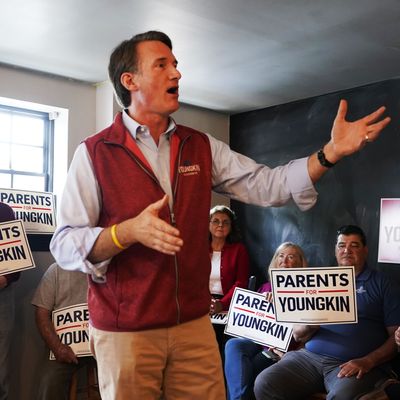
In a very self-satisfied op-ed for the Washington Post, Virginia’s new governor, Republican Glenn Youngkin, uses up some leftover campaign rhetoric regarding parental rights in education — his signature issue in a winning campaign over Terry McAuliffe last November. What makes the essay interesting is his insistence that individual parents should control not just curriculum or textbook decisions but public-health measures in schools:
On Day 1 of my administration, I signed an executive order that delivered on a promise I made to parents, empowering them to make decisions regarding their children. While some are seeking to sow division between masking factions, I want to be clear: My executive order ensures that parents can opt out their kids from a school’s mask mandate.
While we’re being clear, it should be noted that masks are intended to protect not just the mask-wearer from COVID-19 infections, but those in close proximity. There may be a right or wrong answer to the question of mask-wearing policies in schools and other public places, and a greater or lesser sensitivity to some of the trade-offs (e.g., effects on the intellectual and emotional development of kids required to wear masks) involved in mask-wearing. You could certainly defend the notion that individual communities or school districts should have the leeway to make such judgment calls. But the idea that individual parents should control all these decisions, potentially at the expense of the children of other allegedly sovereign parents, is the height of moral relativism (something conservative Republicans are supposed to hate like sin itself). To put it another way, it’s a huge cop-out that Youngkin shouldn’t be boasting about. But it’s part of an ideology of parental control that served him well on the campaign trail, as he proclaims:
Virginia’s parents have had enough with the government dictating how they should raise their children. On the campaign trail, I listened to parents and, as governor, I will continue to listen. School boards throughout the Commonwealth should do the same. To parents, I say: We respect you. And we will continue to work to empower you in the education and well-being of your children.
The idea that parents alone should control every school decision affecting their kids is highly problematic. Public schools aren’t just a publicly financed private benefit for parents, and the education of children isn’t just one of many aspects of child-rearing (as so many parents understandably and correctly observed in alarm when school closures forced them into instructional roles). Traditionally, at least, public schools have always been envisioned as having a civic function, which is why they are tuition-free and open to all. And it’s also why American communities have typically created elected school boards and, in some places, elected school superintendents.
Youngkin’s war on “bureaucrats and politicians” (by which he means school boards and elected officials with some involvement in school policies) is a war on the public nature of public schools. The power he wants to exclusively invest in the current parents of current schoolchildren isn’t taken away from “government,” but from the voters who elect public officials and the taxpayers who finance it all. To be sure, the “parental control” ideology is a shrewd messaging device for conservative pols. Their supporters include parents who insist on homeschooling but want taxpayer subsidies, parents who prefer private and particularly religious instruction but want vouchers, and parents of kids in public schools who are disgruntled with some aspect of their kids’ education (who isn’t?). And that’s not to mention childless individuals and couples who resent paying school taxes.
But pols like Youngkin should tone down some of the “people versus the powerful” rhetoric. If public-school teachers and administrators are simply the hirelings of parents paid to perform customized personal services, like a dry cleaner or drugstore clerk, nobody can object when they behave “selfishly” on subjects like their own potential sickness and death from COVID-19 infections. After all, it’s not like they’re public servants, right?






























